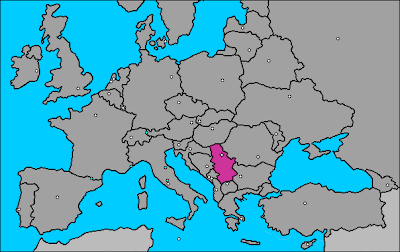
Russian and Serbian officials today signed a multibillion-dollar energy deal that would make Serbia a key hub for Russian energy supplies and strengthen Moscow's dominance of the European energy market.
The agreement includes building a branch of a prospective major natural gas pipeline and a huge gas storage facility in Serbia. A separate agreement also lays the groundwork for Russia's state gas monopoly, OAO Gazprom, to acquire a controlling stake in Serbia's state oil company NIS.
"The agreements signed would make Serbia a key hub in the prospective network of Russian energy supplies to southern Europe," Russian President Vladimir Putin said after the signing. "This network will be long-lasting, reliable, highly efficient, and what is very important, help boost energy supplies to Serbia and the entire European continent."
The agreements, which Serbian officials have estimated as worth at least $2.2 billion, would include building a branch of the prospective South Stream natural gas pipeline in Serbia. South Stream would run under the Black Sea from Russia to Bulgaria, from where it would branch off. The section through Serbia would carry at least 10 billion cubic meters a year, Gazprom CEO Alexei Miller told reporters after the signing.
The 550-mile, $15 billion project undercuts the prospective U.S.- and EU-backed Nabucco pipeline designed to ease Europe's reliance on Russia by carrying gas from the Middle East and Caspian countries other than Russia via Turkey.
Serbia's President, Boris Tadic, said the deal would bolster Serbia's standing by making it a key transit country for energy supplies to Europe.
"This agreement has a huge strategic importance for Serbia," Tadic said. "It will strengthen Serbia's strategic positions in southeastern Europe, since it will serve as a transit point for gas supplies to the EU's southern flank."
Belgrade has turned increasingly away from the West and toward Russia, which has supported Serbia in the debate over independence for the province of Kosovo.
The agreement includes building a branch of a prospective major natural gas pipeline and a huge gas storage facility in Serbia. A separate agreement also lays the groundwork for Russia's state gas monopoly, OAO Gazprom, to acquire a controlling stake in Serbia's state oil company NIS.
"The agreements signed would make Serbia a key hub in the prospective network of Russian energy supplies to southern Europe," Russian President Vladimir Putin said after the signing. "This network will be long-lasting, reliable, highly efficient, and what is very important, help boost energy supplies to Serbia and the entire European continent."
The agreements, which Serbian officials have estimated as worth at least $2.2 billion, would include building a branch of the prospective South Stream natural gas pipeline in Serbia. South Stream would run under the Black Sea from Russia to Bulgaria, from where it would branch off. The section through Serbia would carry at least 10 billion cubic meters a year, Gazprom CEO Alexei Miller told reporters after the signing.
The 550-mile, $15 billion project undercuts the prospective U.S.- and EU-backed Nabucco pipeline designed to ease Europe's reliance on Russia by carrying gas from the Middle East and Caspian countries other than Russia via Turkey.
Serbia's President, Boris Tadic, said the deal would bolster Serbia's standing by making it a key transit country for energy supplies to Europe.
"This agreement has a huge strategic importance for Serbia," Tadic said. "It will strengthen Serbia's strategic positions in southeastern Europe, since it will serve as a transit point for gas supplies to the EU's southern flank."
Belgrade has turned increasingly away from the West and toward Russia, which has supported Serbia in the debate over independence for the province of Kosovo.
Tadic and Serbian Prime Minister Vojislav Kostunica both thanked Moscow for its support on Kosovo at the start of his talks with Putin.
"Serbia very deeply respects the position of Russia on Kosovo," Tadic said at the start today's talks with Putin. "We will defend our interests in Kosovo, operating on the basis of international law and we will never do otherwise."
Putin reaffirmed Moscow's strong opposition to Kosovo's independence.
"Russia is categorically against a unilateral declaration of independence for Kosovo," he said, adding that it could "seriously damage the system of international law and have negative consequences for the Balkans and affect stability in other regions."
Moscow last year threatened a veto in the U.N. Security Council to block a Western-backed plan for internationally supervised statehood for Kosovo.
Russia has used the rift to strengthen business and diplomatic ties to Serbia — with which Moscow has historic cultural and linguistic ties.
Serbia endorsed the energy deal days after Putin won Bulgaria's support last week for the South Stream project.
The terms of the deal for Gazprom to acquire a 51 percent stake in Serbia's state oil company NIS weren't announced, but Serbian Energy Minister Aleksandar Popovic has confirmed reports that Russia offered $600 million — just one-fifth of the company's estimated market value — and an additional $730 million in modernizing the run-down company. He said Tuesday that Serbia would try to better the price in further negotiations.
Source: Associated Press
Blogalaxia:Gazprom fotolog Technorati:Gazprom Bitacoras:GazpromagregaX:Gazprom
No comments:
Post a Comment